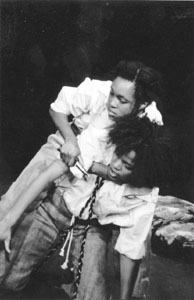![[Metroactive Stage]](/stage/gifs/stage468.gif)
[ Stage Index | Santa Cruz Week | SantaCruz Home | Archives ]
Existential Blues
The Actors' Theatre teeters on the void in the fascinating new production of 'The Poor Players'
By Mike Connor
AH, THE GOOD old void. That anti-concept, the not-space between being and nothingness. The nonexistent contradiction. The Actors' Theatre.
The Poor Players, an outstanding new play written by Dan LeFranc and directed by Shakina J. Nayfack, revisits the absurdist void with crafty imagination and daring wit. Three African American women struggle to make sense of their sudden and mysterious existence on a small open stage, and they talk it all out with words, words, words. Calling this play verbose is like saying the Taj Majal is big. But it's also lightning-quick and impossibly clever, delivered energetically and with plenty of personality, so that even the driest existential conundrums seem witty and natural. Still, a strong cup of coffee before the play is a good idea.
As the audience files in thusly caffeinated, two women dressed in identical burlap pants and white button-down shirts are already onstage. One of the players watches the crowd as she sits on an upended chair absently carving on a wooden table with a knife. Is it art or just a particularly stern reminder that all pagers and cell phones should be turned off before they start? You be the judge.
In any case, as the play opens Reb (Niketa Calame) and Claude (Shanta Wilson) find themselves on a small set, sparsely decorated with a wooden table and chair, an old oak tree and a rock. Panels of worn, wooden fencing give the set the feel of a yard outside an old barn. In classic Beckettian fashion, the audience and the characters wait for something to happen. Claude wakes up, and the two women dig into each other like a college-educated Laurel & Hardy, insulting each other with clever musings about being and nothingness. "The absence of you has never been present here," Reb points out wryly, as the women try to get a handle on who they are and why they exist.
The Poor Players is dizzyingly but delightfully self-referential, as the characters have a vague awareness that there is an audience watching them. Repeatedly, Reb pokes through the illusive boundary that separates the performers from the audience, playfully prodding you to think about your role as a member of the audience. This theatrical device slowly unfolds into the crux of the play, as the characters' fates are defined by their understanding of their own roles.
The brainiac theatrical ambitions of this play would very likely overwhelm it with concept and commentary, were it not for the strength of the players' characters. Despite their sudden and inexplicable existence, each of the characters is distinct and engaging from the get-go. In a post-performance discussion, director Nayfack and the cast discussed how the dialogue was tailored to fit the actors, and it shows.
Through all the clever wordplay and highbrow bickering, we gradually discover the characters' personalities, and learn more about their reality. The white, blonde-haired Stage Manager (Jacqueline Jensen), whom the cast never notices, introduces new objects as clues to keep the characters guessing, starting with the Book. "It was morning, then it was not-morning, then it was Book," Reb observes wondrously. Said Book apparently contains Everything, including knowledge about the origin of money, religion and power. Hopelessly detached from any sense of culture and history, Claude cuddles the sweet "tangible, tangible pages" of pure Eurocentric knowledge.
Enter Angela Farr as the wildly curious Heath, a being so fresh in the void that even her own movements surprise her. Farr brings incredible energy and intensity to the part, making her character so frenetically, hyperactively curious that it seems that any moment she will dive into the audience, picking up purses and other loose objects, wondering "What's this? What's this?" Heath's energy and desire to look beyond the cultural artifacts presented to her within the play inspires Reb to reach beyond her passive role. Startlingly beautiful poetry works its way into the dialogue when Reb and Heath discover emotional currents within them that are deeper than mere comedy.
Armed with the Book, a crucifix and a knife, Claude seeks to control and manipulate Heath's free spirit with historical modes of repression, using money, religion, education and, ultimately, violence. "You have no comprehension of the powers I can yield with the assistance of the Book" Claude says menacingly. Comedy degenerates into tragedy as Claude's designs become increasingly insidious. When a television arrives, the culture-starved Claude hungrily emulates the images she sees there. Her transformation into a hideously demented June Cleaver-esque matriarch is a disturbing vision of the consequences of cultural isolation and ill-fitting roles.
Copyright © Metro Publishing Inc. Maintained by Boulevards New Media.
![]()
 Baby Got Back: Angela Farr jumps Shanta Wilson in Shakina J. Nayfack's 'The Poor Players.'
Baby Got Back: Angela Farr jumps Shanta Wilson in Shakina J. Nayfack's 'The Poor Players.'
The Poor Players runs Thursday-Saturday, May 9-11, at 8pm and Sunday, May 12, at 2pm at the Santa Cruz Actors' Theatre, 1001 Center St. Tickets are $10 at the door. For reservations and info, call 460.9606.
From the May 8-15, 2002 issue of Metro Santa Cruz.